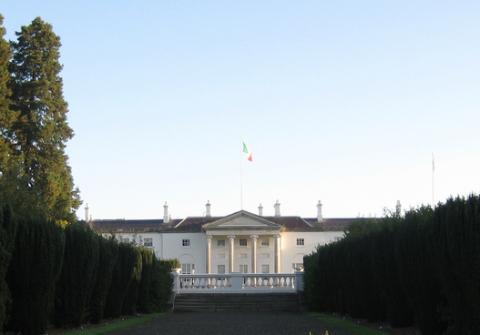Candidates should wake up to limits of president's role

All this talk about the president being the protector of the constitution is just the silly conceit of people who fantasise themselves in that role. By Vincent Browne.
Gay Mitchell and Mary Davis think the president is the protector of the constitution. David Norris thinks a president can defy the government of the day in the way he said Mary Robinson attempted in 1991.
Michael D Higgins is attracted by the idea of ‘‘expanding’’ the role of the president, rather as he says Mary Robinson did. Sean Gallagher thinks he can drive the entrepreneurial spirit of the nation from Áras an Uachtaráin. An interviewer framed a question during the week on how a president should deal with a constitutional crisis, such as might emerge from an inconclusive election.
They might all benefit from reading the few short pages related to the presidency in the constitution and, at a push, consult the authoritative textbook on the constitution, entitled JM Kelly: The Irish Constitution (Fourth edition) by GW Hogan and GF Whyte (remarkably, the book is written in intelligible English).
The president is not the protector of the constitution. The president may not defy the government of the day on any matter, except in very limited circumstances specified in the constitution. ‘‘Expanding’’ the role of the presidency is permitted by the constitution, but only if laws are passed specifying that. Otherwise it is very dubious. A president driving the entrepreneurial spirit of the nation - or any other spirit of the nation - is permissible only if provided by law, or if the government of the day wants the president to do that. The Mary Robinson initiative as president was a very risky enterprise. If any new president is hell-bent on treading the same path, there is danger there.
First, this protector of the constitution thing. The constitution specifies that an incoming president has to swear an oath to ‘‘maintain’’ the constitution. But the only function the constitution allocates to the president is in article 26,which permits the president, following consultation with the Council of State, to refer a bill to the Supreme Court to test its constitutionality before signing the bill into law. But if a president is concerned to protect the values of the constitution, he or she should never exercise this power because of another article in the constitution (article 34.3.3), which disbars further challenges to a law that survives the article 26 reference, even if, in practice, the law turns out to be obnoxious in ways not envisaged at the time of the reference. Dana is right: you don’t have to be a barrister, or even a solicitor, to be president. A president should arguably never refer a bill to the Supreme Court under article 26, unless everyone on the Council of State advises that this be done - and even then, don’t do it. Simple!
So this stuff about the president being the protector of the constitution is just the silly conceit of people who fantasise themselves in that role. Apart from referring bills to the Supreme Court and refusing to dissolve the Dáil on the advice of a taoiseach who has lost the confidence of the Dáil (this provision, by the way, is a mess, for it is unclear how the president determines that a taoiseach has lost the confidence of a majority of the Dáil), the president has no powers to do anything. So the stuff about defying the government of the day - however craftily - is not on. Mary Robinson ran a very precarious line in defying Charlie Haughey in 1991.
Article 13.9 of the constitution states clearly: ‘‘The powers and functions conferred on the president by this constitution shall be exercisable and performable by him only on the advice of the government,” except for the specific provisions in the constitution where the president may act otherwise. (Apologies for the sexist language, but that is what the constitution says.)
It might be argued, as I think Robinson did, that the limitation on the president’s role as provided in this section of the constitution was limited only to the specific powers and functions specified in the constitution, and that otherwise the president is free to do what she or he likes. However,the experts on the constitution (Messrs Hogan and Whyte) think differently. They write (page 207): ‘‘The scheme of the constitution does seem to preclude the president from engaging in activities not specifically mentioned in the constitution, unless this is provided for in legislation.’ ’Another constitutional expert, David Gwynn Morgan of UCC, said that Robinson ‘‘overstepped the mark’’ in her defiance of Charlie Haughey. So this nonchalant talk about ‘‘expanding’’ the role of the president is problematic at best.
And as for the president having a role in sorting out a constitutional impasse arising from an inconclusive election: no way, José . By the way, the oath which the incoming president swears is also problematic. It starts with ‘‘In the presence of almighty God’’. In 1993, the UN Human Rights Commission indicated that this violated article 18 of the International Covenant on Civil and Political Rights.
Image top: René Slaats.
